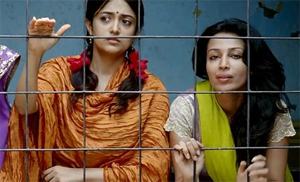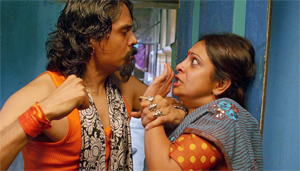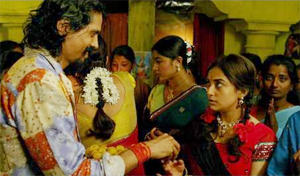 The 16th edition of the London Asian Film Festival (LAFF) opened last Sunday with the European premiere of Lakshmi, written and directed by Nagesh Kukunoor.
The 16th edition of the London Asian Film Festival (LAFF) opened last Sunday with the European premiere of Lakshmi, written and directed by Nagesh Kukunoor.
The film, which won the Audience Award for Best Narrative Feature at the Palm Springs International Film Festival in January, is based on the real-life story of a 14-year-old girl kidnapped from her village in Andhra Pradesh and forced into prostitution. She was eventually rescued in a police raid and later testified in court against her traffickers, winning the case and setting a precedent for future legal actions. The director also plays the role of Chinna, the pimp that runs the brothel.
BollySpice had the opportunity to speak with the director. Check out what he said about the film and the blot of human trafficking.
You mentioned that the inspiration of the film comes from your visit to shelters, where you met women who went through the same situation. Why did you choose Lakshmi and not another girl?
The issue is overwhelming. Hundreds of thousands of girls are forced into prostitution. I’m drawn to heroic stories. I don’t like movies to end on a dark note. And this was the girl who had the courage to take the traffickers to court. And she won, it was the first case.
But let me be honest. The story serves the purpose I was talking about, because when you hear so much, it brings you down. You want that little ray of hope.
Would you describe the film as a ray of hope?
Absolutely. A social worker friend of mine told me something beautiful. He said that the problem is so vast that you can’t let it overwhelm you; you have to celebrate your victory, one girl at a time.
 The story focuses on Lakshmi. You chose Monali Thakur. Did you prepare this emotional role in a specific way?
The story focuses on Lakshmi. You chose Monali Thakur. Did you prepare this emotional role in a specific way?
Monali came in for the first audition and she got it. As simple as that. She did so good that I called her for another audition. I made her do different things, and every time I gave an instruction she got it. So I said ‘even if this girl doesn’t understand every small thing, she understands enough to be able to translate directions’. So I said ‘ok, I’ll guide her through it’, and this is how I went about it. But she came with her skill set right from the beginning.
You also play a very important role in the film. Did you know from the beginning that you were going to play that role?
I think that at some level. When I was writing Chinna I kept constantly thinking that there are so many good character actors in India, and how that person would play it. Chinna does so many disgusting, despicable things. Give it to someone and he’ll want to do so much with it, take it over the top. So I felt that at some level he would destroy Chinna.
How did you prepare the role?
I knew very clearly that I wanted to play Chinna as an idiot. I never wanted to play Chinna as a stud. He thinks he is a stud but he is an idiot. And I felt that if I give it to another actor he would destroy it. That was the main idea. Having said that, you do what every actor does: you prepare the lines, you work on your body language. It’s nothing great, all actors do that.
You have said that the most important for you is that you want the film to be seen, and you have mentioned the screenings for NGOs. Can you tell me more about it?
We released the film in India on March 21st. Even before we did that, from October we started screening the film at colleges across India. There were two reasons:
 One – spread the word. Let other people know that this film is available. The youth is where the change begins, and if they believe in the right topic, they will champion it. They may not do anything today, but five years later when they are in a position of power, you never know.
One – spread the word. Let other people know that this film is available. The youth is where the change begins, and if they believe in the right topic, they will champion it. They may not do anything today, but five years later when they are in a position of power, you never know.
Second – before the release, a few NGO screenings happened, not many. But once the pressure of the release went away, we just told anyone who wanted to screen the film to sensitize their segment to take it.
Initially I thought that I didn’t want to show the film to sex workers. What’s the point of making them watch their own suffering? But the NGOs told me that the fact that she wins will give them hope to be another Lakshmi.
Finally, do you have any projects in the future? Are you already thinking on the next story?
I’m starting the shooting of my next film in a month. So I was debating if I should come or not to London, but it’s the opening so I had to be here.
The London Asian Film Festival (LAFF) features a selection of independent South Asian films, as well as interviews, workshops and performances. Nagesh Kukunoor will also offer a director’s master class on Wednesday as part of the festival.
This year’s LAFF will go on until June 14th.









